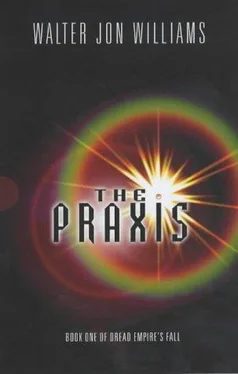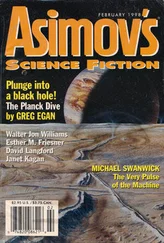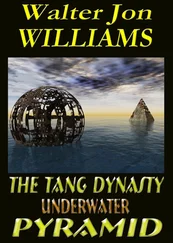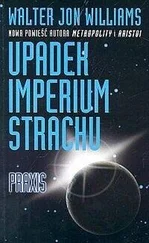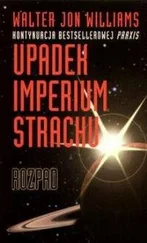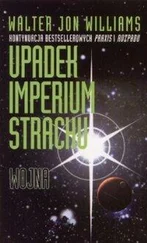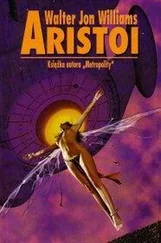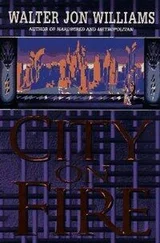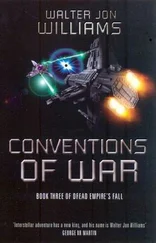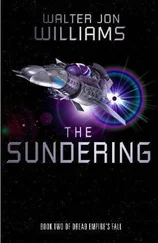He passed the Shelley Palace on the way, where he knew his sisters, along with PJ Ngeni, were hosting a small reception for his brother Roland, who had arrived three days ahead of the funeral. It wasn’t a party, since parties on the day of the last Shaa’s death would have been bad form. It would be a mourning function, a kind of wake, and was restricted by custom to twenty-two guests.
Martinez wasn’t one of them. The Fleet was still on alert, and he would be spending the next shift in the Commandery, handling the signals traffic that might result from an emergency, should there actually be one.
Then he would turn in the Commandery ID that entitled him to enter the building, after which he would go to his apartment and give Alikhan his jacket, so his orderly could pick away the tiny stitches that fixed the red staff tabs to his collar.
Sula spent the day commanding a guard detail on a skyhook terminus on the first level of Zanshaa’s accelerator ring. The ring was built in two sections. The lower part rotated at the same speed as the planet below, which gave it a very light gravity, and was used for antimatter generation, storage, and utility conduits. The second, outer section glided atop the inner ring like the second hand of a clock, spinning faster than the hour hand; it moved at nine times geosynchronous speed in order to maintain one standard gravity. It was this second level that contained docks, repair bays, and housing for the population of the ring.
Sula’s dozen recruits carried stun batons, and she herself wore a sidearm on one hip and a viridian-green helmet on her head. She couldn’t help but wonder what this pathetic force was supposed to do in the event of a raving mob of anarchists charging down from the outer ring to seize the skyhook, other of course than to die pointlessly with all the bravery they could muster.
Nothing happened. Civilian traffic was nil, and military traffic nearly so until her relief arrived, a detail of Naxids armed with gatling guns and grenade launchers.
Naxids didn’t fool around, Sula concluded.
She took her detail to the outer ring, where she turned in her sidearm and her detail’s stun batons, then wondered what to do next. Mourning had closed down all entertainment, on the planet or off, and filled all hotels, so she couldn’t get a room.
In the end she requested a billet in the traveling cadets’ hostel and found half a dozen cadets passing a bottle around while shooting dice. She let them get drunk, won their money, then retired to her rack filled with a rare, pleasing sense of accomplishment.
“Reporting aboardCorona, my lord.”
Martinez, head thrown back before his new captain, gazed with level eyes above the captain’s head at the massive gleaming structure on the shelf behind him, the Home Fleet Trophy thatCorona’s football team had just won in a short season truncated by the death of the last Shaa.
One other Home Fleet Trophy stood on a special shelf in the corner, locked into place and braced against high accelerations. A second-place trophy sat on a somewhat less special shelf. Other, lesser trophies, all topped by gleaming crystal footballers, crowded Lieutenant Captain Tarafah’s desk on all sides.
“At ease, Lieutenant Martinez,” Lord Fahd Tarafah said, which allowed Martinez to drop his chin and contemplate his new commander. Tarafah was a compact, well-formed man with a shaven head and neatly trimmed goatee, still under thirty. On his left sleeve, just above the cuff, was the stylized football insignia that all the Coronas were entitled to wear for the next year.
“You’ve reported to Garcia?” Tarafah asked, referring to the officer on watch.
“Yes, my lord. She’s shown me my quarters and given me the code to my safe. She was going to give me a more thorough orientation after her watch.”
“It’ll be useful to have another watch-keeping officer aboard. Your orders and records have been logged on the computer?”
“Yes, my lord.”
Tarafah opened his collar, took his captain’s key from around his neck, and called Martinez’s records onto his displays. His eyes scanned back and forth, then halted, no doubt focused on the candid evaluations of Martinez’s abilities and character provided by his former commanders, evaluations that Martinez carried around with him as part of his permanent record but did not possess the codes to read.
“What sports did you do at the academy?” Tarafah asked. Which, Martinez knew, was the question that might well doom him.
“An absolute fanatic about football,” Ari Abacha had said approvingly, when Martinez had asked him about Tarafah at the junior officers’ club. “Pulls every string he can to get the top players on his ship, and when strings won’t work, he lays out the cash. Rumor has it that he bought Captain Lord Winfield a new yacht in order to guarantee the transfer of a new outside forward.”
Abacha approved of the Fleet’s fanatic football officers, and if his devotion to languor hadn’t been so all-encompassing, he would probably have been one himself, either a player, coach, or manager. As it was, Abacha contented himself with absorbing everything known about the subject—the players, the statistics, the tactics, the managers and coaches—and had a profitable sideline running a sports book for other officers.
Corona’sappearance only confirmed Abacha’s assessment. Tarafah had painted his ship green—not the viridian green of Zanshaa’s sky, but the bright lawn green of a football pitch, with the white midfield stripe bisecting the frigate lengthwise and a motif of white soccer balls bouncing down the ship’s sides.
Coronawas a small ship to field such an important team. With a crew of only sixty-one, to get a first-rate team of eleven players, plus alternates and coaches and support—enough to make a serious bid for the Home Fleet Trophy, against ships with ten times the crew strength—required single-minded dedication and deep pockets.
“I did fencing and swimming, my lord,” Martinez said. Sports where his long arms and comparatively short legs worked to his advantage.
He suspected it wouldn’t help to mention that he was school champion at hypertourney, an abstract positional game with a computer-generated playing field. Hypertourney was probably a little too intellectual for Tarafah and theCorona.
“We do football on theCorona,” Tarafah said. Which Martinez couldn’t help but think was like saying,In the Legion of Diligence, we do fanaticism.
“Yes, my lord,” Martinez said. “Everyone in the Fleet knows the quality ofCorona’s team.”
The compliment indirect, Martinez thought. One should start small, then work slowly up toward finding the level of flattery appropriate for one’s commander.
The praise at least persuaded Tarafah to ask Martinez to sit. Martinez drew up a chair and watched the lieutenant captain with all due attention.
Tarafah folded his hands atop his desk and leaned forward. “I don’t believe that any officer can succeed on his own, Lieutenant,” he said. “I believe that a ship’s company is a team, each dependent on the others for success.”
“Very true, my lord.” Martinez tried to imply that this was an idea he had never heard before.
“That’s why I expect the entire ship’s company to pull together for the common good, in makingCorona look its absolute best—during fleet maneuvers, during inspections, and on the football field. Each must do his part.”
“Very good, my lord,” Martinez repeated.
“That’s why I expect everyone to support the team. The team makes usall look good, just as polished paneling and spotless floors give us the look of a ship where everything is completely up to the mark. Do you understand?”
“Yes, my lord. In fact,” Martinez added, “that’s why I hope to contribute directly to the success of the team. I know that I’m probably unsuitable as a player, but I thought I might serve as a coach, or some kind of manager—”
Читать дальше
